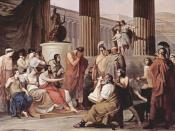Book 8 of the Odyssey helps to show an interesting value that the Greeks held high, and that we hold high in our society today. This important value is that wrongs done to people must be paid for. The story of Ares and Aphrodite, the argument between Euryalus and Odysseus, and the underlying conflict between Odysseus and the suitors he has not yet met are three specific instances in book 8 that prove this values importance to the Greek culture.
Aphrodite is the wife of Hephaestus, a blacksmith, and a god. Ares the very athletic and very handsome god is sleeping with the Goddess Aphrodite behind Hephaestus' back. Hephaestus' friend and messenger, Hermes, becomes aware of the affair taking place and informs Hephaestus. Cunning Hephaestus, upset and angry, begins plotting his revenge. He first forges an unbreakable chain that will ensnare the two fornicators when they again lie in bed together.
Next, he tells his wife that he is leaving to visit his favorite city, Lemnos. During his short trip he has Hermes spy on the two, so that when they lie down together and get caught in the chains, he can inform Hephaestus and he can return to catch them in bed. His cunning plan works, he has Ares and Aphrodite trapped in the bed, and calls the other gods to come and witness the wrong that has been done to him. The gods all come in and see what has happened. They utter such phrases as "Crime doesn't pay" and "Ares has to pay the fine for adultery" on page 116. Poseidon pleads with Hephaestus, "Let him go, and I will ensure he will pay you fair compensation before all the gods." This is a story that is told to an entire banquet and many people are surely going to hear it. I'm sure this story to the Greek culture served more as a teaching technique for children and young men then for mere entertainment. We still use the same technique today to teach lessons to children and adults alike. Rather than stating a lesson such as, "if you commit a wrong, you will pay for it", it is far more memorable if you can physically see or visualize the same lesson in a specific example. In out society today we see many movies and a very prevalent theme throughout many movies is the fact that crime doesn't pay, just like Poseidon says. It is very similar to the idea the bad guy never wins. Of course the bad guy can't win. If the bad guy wins, everything we have been taught to be right and everything we are taught to be wrong get mixed up. The story of the affair between the god and the goddess just proves that even stories within stories as old as the Odyssey must have lessons that follow the lessons of society. After all, if the gods, Greece's top "citizens", must pay for the wrongs they commit, it stands to show how important paying for wrongs is to all the people of Greece.
Next we come to the argument Euryalus has with Odysseus. Euryalus is rude and offensive to Odysseus. He challenges him not only in athletics, but also in his lineage and honor. The king Alcinous recognizes it, and while immediately he does nothing to stop it, he eventually forces Euryalus to pay Odysseus homage with gifts and weapons. He also forces his entire kingdom to compensate Odysseus, because he knows he committed a wrong by not stopping Euryalus' speech more quickly. I believe he did not stop him sooner because he was unsure who Odysseus was at the time. Odysseus may have been a ragged seamen or a merchant as Euryalus suggested. If Odysseus had proved to be not of noble heritage, then certainly the hospitality code shared by the nobles would not have been broken and no wrong would have been committed. The king quickly realizes the wrong he committed when Odysseus' nobility is proven and rectifies his wrong by giving this speech on page 118, "Hear me Phaecian lords and counselors. Our guest seems in my eyes to be a man of the highest discernment, come, then, let us give him a gift that befits a guest....... A fresh cloak and tunic and a bar of fine gold." He continues to say that Euryalus must apologize a give him a gift, because what he said "was in no way proper." Odysseus accepts a bronze sword from Euryalus as payment for the wrong committed and the two speak pleasant words to each other. The issue is now resolved.
Throughout the Odyssey, Odysseus is being wronged, much of the time without his knowledge. He is being wronged by the suitors, many of which he welcomed into his home as children and took care of them like they were his own children. Now these various men of Ithaca are eating his livestock, drinking his wine, plotting his son's death, and trying to marry his wife. This is perhaps the ultimate wrong and the suitors will face the ultimate reprisal. Because this wrong goes on throughout the poem, it can only be assumed how important it will be for Odysseus to exact revenge on them. Odysseus hears the story of Ares and Aphrodite, so one can infer that he has been taught the lesson that a wrong must be righted. While Odysseus will return home to a similar situation as Hepheastus, the situation is not exactly the same. Odysseus' wife, Penelope, has not committed adultery. In fact, she has waited patiently for twenty years hoping and wishing that Odysseus would return so that he may restore the kingdom of Ithaca and vanquish the suitors. When Odysseus does in fact return home, he very quickly goes about creating a plan, with the help of the goddess Athena, to rid his household of the army of suitors. The end result of Odysseus exacting his revenge on the suitors really proves how important this value of payment for wrongs is to the Greeks. Odysseus, and his three companions, will go up against well over a hundred suitors including their slaves and aides. Odysseus with the help of the goddess Athena easily kills every last suitor without sustaining any major injuries or casualties to his three friends. I think this amazing feat is not an example of Odysseus' legendary strength, but rather a lesson to all Greeks that if one commits a wrong no matter how easily one thinks one can get away with it, one will be required in some shape or form to pay the debt one owes.
Any lesson that can help deter someone from committing a crime, or more simply a wrong, is a great lesson for our society today as well as it was for the Greek society of long ago. This lesson was repeated and proven in the story of Ares and Aphrodite, the argument between Euryalus and Odysseus, and the conflict between Odysseus and the suitors.





